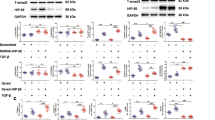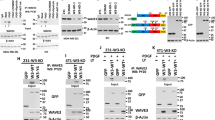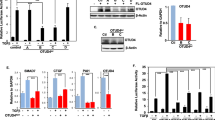Abstract
Transforming growth factor β (TGF-β) has a major role in cell proliferation, differentiation and apoptosis in many cell types. Integration of the TGF-β pathway with other signalling cascades that control the same cellular processes may modulate TGF-β responses. Here we report the discovery of a new functional link between TGF-β and growth factor signalling pathways, mediated by a physical interaction between the serine-threonine kinase PKB (protein kinase B)/Akt and the transcriptional activator Smad3. Formation of the complex is induced by insulin, but inhibited by TGF-β stimulation, placing PKB–Smad3 at a point of convergence between these two pathways. PKB inhibits Smad3 by preventing its phosphorylation, binding to Smad4 and nuclear translocation. In contrast, Smad3 does not inhibit PKB. Inhibition of Smad3 by PKB occurs through a kinase-activity-independent mechanism, resulting in a decrease in Smad3-mediated transcription and protection of cells against TGF-β-induced apoptosis. Consistently, knockdown of the endogenous PKB gene with small-interfering RNA (siRNA) has the opposite effect. Our results suggest a very simple mechanism for the integration of signals arising from growth-factor- and TGF-β-mediated pathways.
This is a preview of subscription content, access via your institution
Access options
Subscribe to this journal
Receive 12 print issues and online access
$209.00 per year
only $17.42 per issue
Buy this article
- Purchase on Springer Link
- Instant access to full article PDF
Prices may be subject to local taxes which are calculated during checkout





Similar content being viewed by others
References
Massague, J. TGF-β signal transduction. Annu. Rev. Biochem. 67, 753–791 (1998).
Heldin, C.H., Miyazono, K. & ten Dijke, P. TGF-β signalling from cell membrane to nucleus through SMAD proteins. Nature 390, 465–71 (1997).
ten Dijke, P., Miyazono, K. & Heldin, C.H. Signaling via hetero-oligomeric complexes of type I and type II serine/threonine kinase receptors. Curr. Opin. Cell Biol. 8, 139–45 (1996).
Moustakas, A., Souchelnytskyi, S. & Heldin, C.H. Smad regulation in TGF-β signal transduction. J. Cell Sci. 114, 4359–4369 (2001).
Attisano, L. & Wrana, J.L. Signal transduction by the TGF-β superfamily. Science 296, 1646–1647 (2002).
Tanaka, S. & Wands, J.R. Insulin receptor substrate 1 overexpression in human hepatocellular carcinoma cells prevents transforming growth factor β1-induced apoptosis. Cancer Res. 56, 3391–3394 (1996).
Buenemann, C.L., Willy, C., Buchmann, A., Schmiechen, A. & Schwarz, M. Transforming growth factor-β1-induced Smad signaling, cell-cycle arrest and apoptosis in hepatoma cells. Carcinogenesis 22, 447–452 (2001).
Chen, R.H., Su, Y.H., Chuang, R.L. & Chang, T.Y. Suppression of transforming growth factor-β-induced apoptosis through a phosphatidylinositol 3-kinase/Akt-dependent pathway. Oncogene 17, 1959–1968 (1998).
Brazil, D.P. & Hemmings, B.A. Ten years of protein kinase B signalling: a hard Akt to follow. Trends Biochem. Sci. 26, 657–664 (2001).
Remy, I., Pelletier, J.N., Galarneau, A. & Michnick, S.W. in Protein–Protein interactions: A Molecular Cloning Manual (ed. Golemis, E.A.) 449–475 (Cold Spring Harbor Laboratory Press, 2001).
Remy, I. & Michnick, S.W. Visualization of biochemical networks in living cells. Proc. Natl Acad. Sci. USA 98, 7678–7683 (2001).
Galarneau, A., Primeau, M., Trudeau, L.E. & Michnick, S.W. β-lactamase protein fragment complementation assays as in vivo and in vitro sensors of protein–protein interactions. Nature Biotechnol. 20, 619–622 (2002).
Ghosh, I., Hamilton, A.D. & Regan, L. Antiparallel leucine zipper-directed protein reassembly: application to the green fluorescent protein. J. Am. Chem. Soc. 122, 5658–5659 (2000).
Hu, C.D., Chinenov, Y. & Kerppola, T.K. Visualization of interactions among bZIP and Rel family proteins in living cells using bimolecular fluorescence complementation. Mol. Cell 9, 789–98 (2002).
Yanagisawa, K. et al. Induction of apoptosis by Smad3 and down-regulation of Smad3 expression in response to TGF-β in human normal lung epithelial cells. Oncogene 17, 1743–1747 (1998).
Yamamura, Y., Hua, X., Bergelson, S. & Lodish, H.F. Critical role of Smads and AP-1 complex in transforming growth factor-β-dependent apoptosis. J. Biol. Chem. 275, 36295–36302 (2000).
Kim, B.C., Mamura, M., Choi, K.S., Calabretta, B. & Kim, S.J. Transforming growth factor β1 induces apoptosis through cleavage of BAD in a Smad3-dependent mechanism in FaO hepatoma cells. Mol. Cell. Biol. 22, 1369–1378 (2002).
Yang, Y.A. et al. Smad3 in the mammary epithelium has a nonredundant role in the induction of apoptosis, but not in the regulation of proliferation or differentiation by transforming growth factor-β. Cell Growth Differ. 13, 123–130 (2002).
Yang, J. et al. Crystal structure of an activated Akt/protein kinase B ternary complex with GSK3-peptide and AMP-PNP. Nature Struct. Biol. 9, 940–944 (2002).
Belham, C., Wu, S. & Avruch, J. Intracellular signalling: PDK1 — a kinase at the hub of things. Curr. Biol. 9, R93–R96 (1999).
Stroschein, S.L., Wang, W. & Luo, K. Cooperative binding of Smad proteins to two adjacent DNA elements in the plasminogen activator inhibitor-1 promoter mediates transforming growth factor beta-induced smad-dependent transcriptional activation. J. Biol. Chem. 274, 9431–9441 (1999).
Wrana, J.L. et al. TGF β signals through a heteromeric protein kinase receptor complex. Cell 71, 1003–1014 (1992).
Brummelkamp, T.R., Bernards, R. & Agami, R. A system for stable expression of short interfering RNAs in mammalian. Science 296, 550–553 (2002).
Keeton, M.R., Curriden, S.A., van Zonneveld, A.J. & Loskutoff, D.J. Identification of regulatory sequences in the type 1 plasminogen activator inhibitor gene responsive to transforming growth factor beta. J. Biol. Chem. 266, 23048–23052 (1991).
Westerhausen, D.R., Jr., Hopkins, W.E. & Billadello, J.J. Multiple transforming growth factor-β-inducible elements regulate expression of the plasminogen activator inhibitor type-1 gene in Hep G2 cells. J. Biol. Chem. 266, 1092–1100 (1991).
Wildey, G.M., Patil, S. & Howe, P.H. Smad3 potentiates transforming growth factor β (TGFβ)-induced apoptosis and expression of the BH3-only protein Bim in WEHI 231 B lymphocytes. J. Biol. Chem. 278, 18069–18077 (2003).
Li, X. et al. Retinoic acid stimulates chondrocyte differentiation and enhances bone morphogenetic protein effects through induction of Smad1 and Smad5. Endocrinology 144, 2514–2523 (2003).
Kim, W.H. et al. STAT1 plays an essential role in LPS/D-galactosamine-induced liver apoptosis and injury. Am. J. Physiol. Gastrointest. Liver Physiol. 285, G761–G768 (2003).
Stambolic, V. et al. Negative regulation of PKB/Akt-dependent cell survival by the tumor suppressor PTEN. Cell 95, 29–39 (1998).
Staal, S.P. & Hartley, J.W. Thymic lymphoma induction by the AKT8 murine retrovirus. J. Exp. Med. 167, 1259–1264 (1988).
Acknowledgements
We gratefully acknowledge S. Sénéchal for his technical assistance in FACS analysis. We also thank M. Primeau, G. Ghaddar and J. Lamerdin for DNA constructs; K. Luo, A. Conery and A. Moustakas for Smad cDNAs, TBRI, TBRII, cell lines and vectors; D. Billadeau for the pSuppress vector; J. Jin and J. Woodgett for PKB and GSK3β; M. Scheid for PDK1; and M. E. Greenberg for FKHRL1 and BAD. This work was supported by the Human Frontiers Science Program (HFSP) and the Canadian Institutes for Health Research.
Author information
Authors and Affiliations
Corresponding author
Ethics declarations
Competing interests
The authors declare no competing financial interests.
Supplementary information
Supplementary Information Figures
Fig. S1 (PDF 2683 kb)
Fig. S2
Fig. S3
Fig. S4
Rights and permissions
About this article
Cite this article
Remy, I., Montmarquette, A. & Michnick, S. PKB/Akt modulates TGF-β signalling through a direct interaction with Smad3. Nat Cell Biol 6, 358–365 (2004). https://doi.org/10.1038/ncb1113
Received:
Accepted:
Published:
Issue Date:
DOI: https://doi.org/10.1038/ncb1113
This article is cited by
-
RNF12 is regulated by AKT phosphorylation and promotes TGF-β driven breast cancer metastasis
Cell Death & Disease (2022)
-
Periostin gene expression in neu-positive breast cancer cells is regulated by a FGFR signaling cross talk with TGFβ/PI3K/AKT pathways
Breast Cancer Research (2021)
-
Spatial regulation and generation of diversity in signaling pathways
Journal of Biosciences (2021)
-
AKT2 regulates endothelial-mediated coagulation homeostasis and promotes intrathrombotic recanalization and thrombus resolution in a mouse model of venous thrombosis
Journal of Thrombosis and Thrombolysis (2020)
-
CTRP15 derived from cardiac myocytes attenuates TGFβ1-induced fibrotic response in cardiac fibroblasts
Cardiovascular Drugs and Therapy (2020)



